From AI to Zoology: Oxford Brookes students showcase their research degree projects
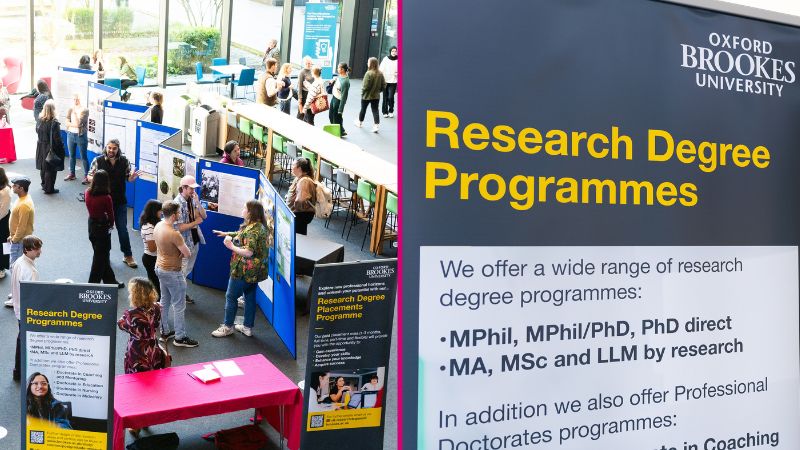
Students from Oxford Brookes’ research degree community presented a wide range of exciting projects at this year’s Graduate College Research Student Annual Exhibition.
The exhibition included work by PhD, professional doctorate and research master’s students from across the University. One of the biggest events in the Graduate College calendar, the exhibition gives research students from all subjects and at every stage the chance to showcase their work to students, staff and external visitors such as placement providers.Catherine Joyejob, Head of the Research Degrees Team at Oxford Brookes, says: “The annual exhibition is a chance for students to develop their communication skills, make more friends and improve their CVs. It’s also an opportunity for current taught students at the end of their courses to consider the possibility of doing a research degree.
“Completing a research degree at Oxford Brookes can transform your future. It’s a great way to develop unique skills and lay the foundations for your career, whether that’s in academic research or elsewhere. We have a vibrant and supportive research community here at Brookes, where you’ll form lifelong professional networks and friendships.”
The latest Research Excellence Framework found that 97% of research at Oxford Brookes was internationally recognised or higher, with 70% judged to be of “world-leading” or “internationally excellent” quality.
If you’d like to know more about research degrees at Oxford Brookes, then contact our Research Degrees Team.
Now hear from some of the research students who presented at the exhibition:
Leah Fitzpatrick, PhD in venomous mammals
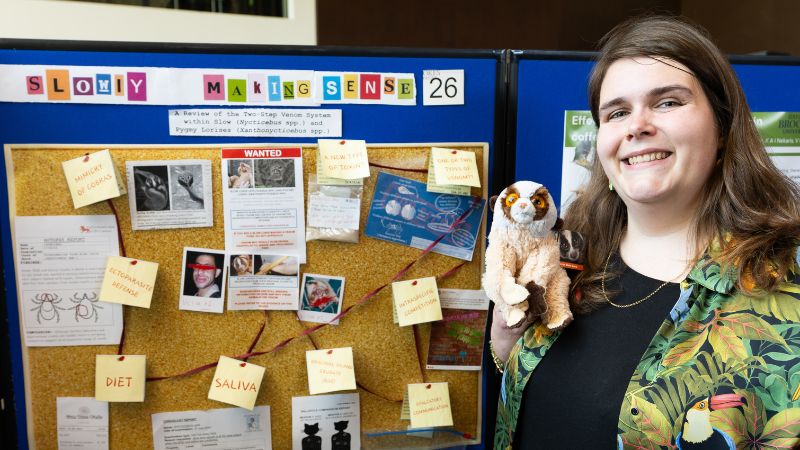
“I know it sounds cheesy, but doing a PhD has been like nothing else I’ve ever done. When I reflect on the process, I’m so glad I decided to do it. I can see how much I’ve changed in terms of my academic progress, and it’s made it crystal clear that I want to be a researcher. I feel like I can make a difference and contribute to my field. I’ve made some fantastic friends and my supervisors have been wonderful.
“My undergraduate and master’s projects were on spider venom, but my PhD is looking to fill gaps in our knowledge of the venom system of slow lorises and pygmy lorises. They’re charming and fluffy, but not many people know that they produce a venom that can cause anaphylactic shock.”
Abishaan Ravikumar, PhD in AI/integrated circuits
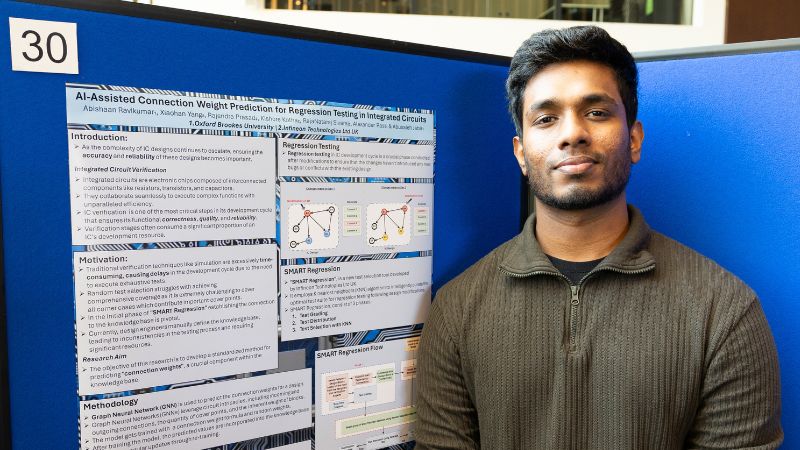
“I’m working on a project exploring whether AI can be used to help test integrated circuits, which are better known as computer chips. As integrated circuits become more complex in their design, it’s really important to check that they are reliable and accurate. I’m using AI to predict one aspect of these circuits called ‘connection weight’.
“My PhD is funded between Brookes and one of its industry partners, Infineon Technologies, which makes semiconductors. I’m getting some good results and I’m excited to be writing up papers and getting things published. Previously I was working in research and development for an IT company in Sri Lanka, but I always wanted to do something like this, which is why I applied for the opportunity. It takes a lot of dedication and hard work, but if academia and research is something that interests you then I’d say go for it.”
Maria de Carli Ball, PhD in film studies
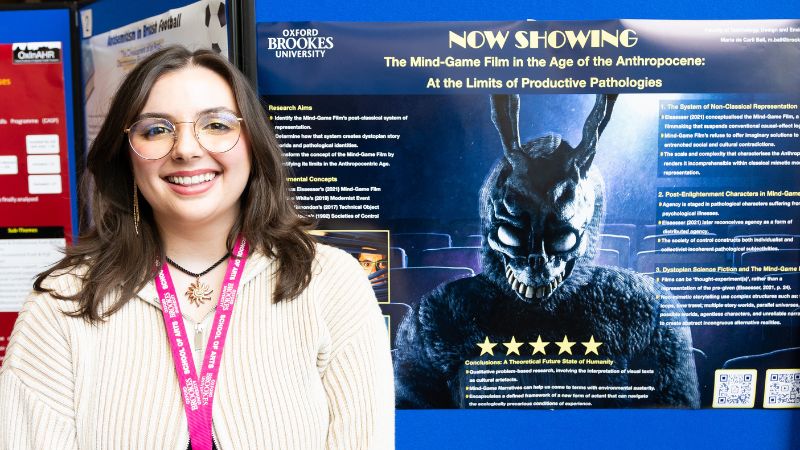
“I completed my undergraduate studies at Oxford Brookes in English Literature and Film Studies, and then I decided to pursue an MA in Film Studies here. Upon completing my master’s I was approached by my supervisor to consider a PhD opportunity, given that I could potentially expand upon the themes addressed in my master’s dissertation (collectivist agency versus individualist agency in narrative structures). I’m so happy that I chose to! It’s lovely to be part of an academic community - everyone’s research is so different and so interesting. I have a tuition scholarship but I’m working part-time in a marketing role at Brookes to help fund everything else. I try to keep to a really strict structure between my PhD and my paid role while being kind to myself if it doesn’t always work. It was difficult at first but I’ve managed to find a good balance now. I’d say don’t be afraid to mix work and study - if anything I feel it makes me more productive.
“My research looks at ‘mind game’ films, which feature narratives that don’t make sense. A good example is Donnie Darko. I argue that an overwhelming and tumultuous event like the climate crisis can only be understood, if at all, through the lens of these incomprehensible narratives.”
Bea Stevenson, EdD (Doctor of Education) in home education
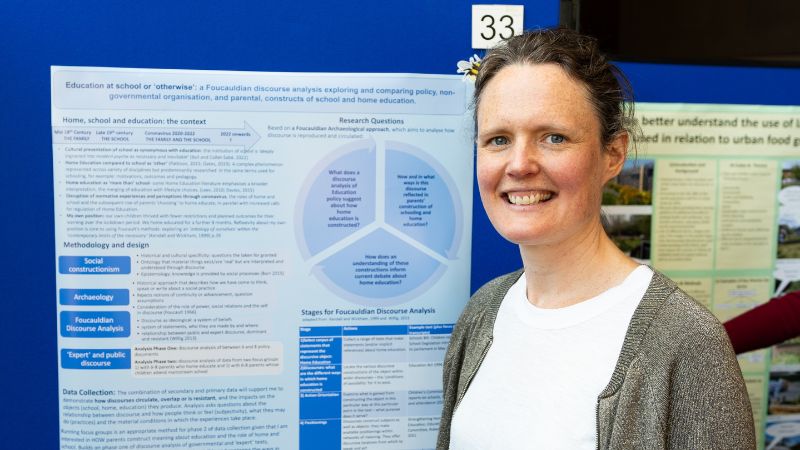
“I’m doing a professional doctorate in education, although mine is slightly unusual in that it isn’t directly influencing my practice. I started out as a primary school teacher in south London but now I work for an Oxford-based charity called the Centre for Emotional Health, supporting and training teachers. The doctorate has been such an amazing thing to do, and it feels like a real privilege to have the space to think really deeply about my professional work. It’s hard work and a big commitment, but 100% worth it. One of the things I’ve loved is doing it alongside other people, most of whom are mature students with between 10 and 30 years of professional experience.
“During the pandemic, when my children were at home, I noticed they were far more relaxed and far more themselves than they were in the school environment. That inspired me to carry out this research into home education. In a nutshell I’m looking at how we construct meaning about home education in a culture that assumes education should take place in a school.”
Claire Mawdsley, PhD in primate conservation
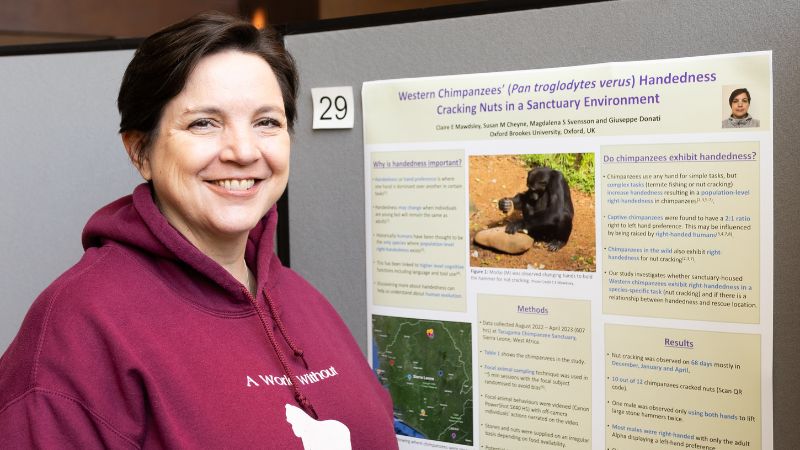
“I did a master’s in primate conservation and enjoyed it so much I decided to stay on to do a PhD. I love research and have loved working with my supervisors at Brookes. Prior to that I had been out of education for a long time. My career was in fundraising for nonprofits and conservation organisations, and I’m still working in that field to fund my PhD. It’s a really welcoming and supportive community here.
“My project is all about the handedness of chimps. Studies show that in the wild, chimps tend to prefer using their right hand as tasks become more complicated, such as cracking nuts. Having a preferred hand has been linked to higher-level cognitive function. I’m trying to find out whether chimps in a sanctuary environment - who have often had horrible starts in life - display the same characteristics. I’ve found that they do retain that behaviour in sanctuaries, which is good to see.”
Exhibition prize-winners
The research degree students who won cash prizes for the best exhibits at the event were:- Emily Armstrong, Faculty of Health and Life Sciences
- Alu Al-Saadi, Faculty of Technology, Design and Environment
- Siddharth Badri, Faculty of Humanities and Social Sciences
